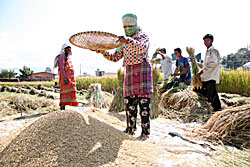 MIN RATNA BAJRACHARYA |
Today's world hunger crisis is unprecedentedly severe and requires urgent measures. Nearly one billion people are trapped in chronic hunger?perhaps 100 million more than two years ago.
World leaders will gather in Madrid next week to move beyond words to action. With Spain's leadership and United Nations Secretary General Ban Ki-moon's partnership, several donor governments are proposing to pool their financial resources so that the world's poorest farmers
can grow more food and escape the poverty trap.
The benefits of some donor help can be remarkable. Peasant farmers in Africa, Haiti, and other impoverished regions currently plant their crops without the benefit of high-yield seed varieties and fertilisers. The result is a grain yield (for example, maize) that is roughly one-third less than what could be achieved with better farm inputs. African farmers produce roughly one ton of grain per hectare, compared with more than four tons per hectare in China, where farmers use fertilisers heavily.
African farmers know that they need fertiliser, they just can't afford it. With donor help, they can. Not only do these farmers then feed their families, but they also can begin to earn market income and to save for the future. By building up savings over a few years, the farmers eventually become creditworthy, or have enough cash to purchase vitally necessary inputs on their own.
There is now widespread agreement on the need for increased donor financing for small farmers (those with two hectares or less of land, or impoverished pastoralists), which is especially urgent in Africa. The UN Secretary General led a steering group last year that determined that African agriculture needs around US$8 billion per year in donor financing? roughly four times the current total?with a heavy emphasis on improved seeds, fertiliser, irrigation systems and extension training.
Research centers such as the International Rice Research Institute and the International Maize and Wheat Improvement Centre provided the high-yield seeds and innovative farming strategies that together triggered the Asian Green Revolution. These centres are not household names, but they deserve to be. Their scientific breakthroughs have helped to feed the world, and we'll need more of them.
Dozens of low-income, food-deficit countries, perhaps as many as 40-50, have elaborated urgent programs for increased food production by small farms, but are currently held back by the lack of donor funding. These countries have appealed to the World Bank for financing, and the Bank made a valiant effort in 2008 to help them through its new Global Food Crisis Response Program (GFCRP). But the Bank does not yet have sufficient funds to meet these countries' urgent needs, and has had to ration assistance to a small fraction of the flows that could be effectively and reliably used. Hundreds of millions of people, in the meantime, remain trapped in hunger.
Despite the dedicated efforts of many professionals, the response to the hunger crisis remains utterly inadequate. The 2008 planting seasons came and went with much too little additional help for impoverished small farmers. African countries search endlessly, and mostly fruitlessly, for the small amounts of funding needed for their purchases of fertiliser and improved seeds.
Donors should pool their funds into a single international account, which we can call the Financial Coordination Mechanism (FCM). These pooled funds would enable farmers in poor countries to obtain the fertiliser, improved seed varieties and small-scale irrigation equipment that they urgently need.
The time for business as usual is over. The donors promised to double aid to Africa by 2010, but are still far off track. Indeed, during the past 20 years, they actually cut aid for agriculture programs and only now are reversing course.
History can be made next week in Madrid when the world's richest and poorest countries converge to seek solutions to the global hunger crisis. The lives of the billion poorest people depend on it.
Project Syndicate
Jeffrey D. Sachs is Professor of Economics and Director of the Earth Institute at Columbia University.



